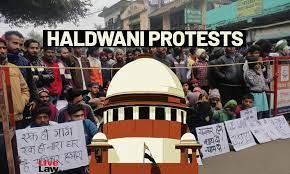A timely halt : On the Haldwani eviction issue
Supreme Court must lay down rehabilitation norms for eviction from public spaces
The Supreme Court’s timely intervention has halted the forcible eviction of some 50,000 people from Haldwani in Uttarakhand, where the occupants are accused of squatting on railway property for decades. The Uttarakhand High Court had taken a tough stand against the residents, and passed a slew of directions that would have entailed their eviction within a week, backed by force, including the deployment of paramilitary forces. It is significant that the Bench underscored the human angle to the issue and spoke about the need for rehabilitation before eviction while staying the order. In an earlier round of litigation over the same land, which adjoins the Haldwani Railway Station, court orders had allowed proceedings against individual occupants under the Public Premises (Eviction of Unauthorised Occupants) Act, 1971, to be completed. This time, too, it was on a PIL that the High Court had passed its orders. The High Court’s detailed judgment shows that the residents’ claim is traceable to a 1907 Office Memorandum that says the area be managed under rules pertaining to ‘ nazul land’. The court has ruled that it was not a government order but only a communication on how to manage the land, and it does not amount to declaring it as ‘ nazul land’, that is, land that has fallen into the hands of the state by escheat. As one of the nazul rules is that there cannot be sale or lease, the court rejected all claims made by occupants based on purported documents for lease, sale, and, in some cases, purchase through auction.
Conflicts between occupants of public land and the state that wants to reclaim the land are a never-ending saga in the country. A shortage of housing, as well as inadequate recognition of the right to shelter, means that large masses of people encroach on vacant land, be it on the bed of water bodies or government property. This often leads to attempts to evict the occupants and spawns litigation. Invariably, there are claims to occupancy rights based on long years of stay at the same location. There are court judgments that stress rehabilitation measures and consultation with the oustees before eviction. Some courts have also recorded the view that mandatory rehabilitation may prove to be an incentive for encroachment. The Haldwani eviction effort has unfortunately taken communal overtones, and there appears to be a clamour for the early eviction of the Muslim residents. India does not have a good record on rehabilitation of those evicted from public spaces, and this case presents an opportunity to the Supreme Court to lay down the law on meaningful rehabilitation as well as effective prevention of encroachments.
